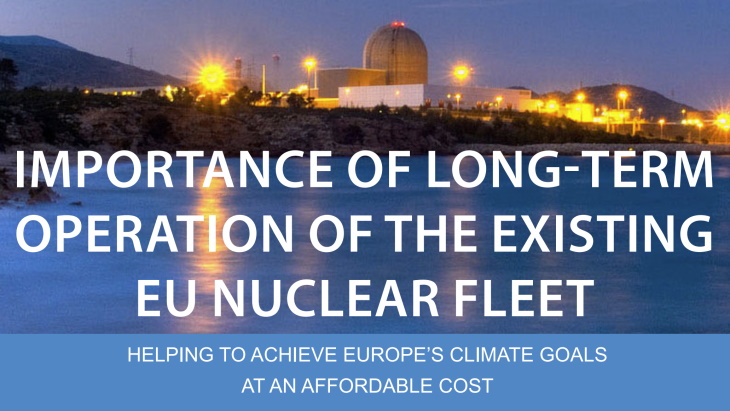The new document is an update of the position paper published by Foratom in July 2019, and takes into account the following: more ambitious EU 2030 emission targets; potential security of electricity supply issues identified in some countries which are pursuing a massive renewable deployment path; new information regarding the levelised costs of electricity of nuclear LTO; the updated version of the Pathways to 2050: role of nuclear in a low-carbon Europe report by Compass Lexecon; Brexit and thus consideration of only the EU27 in all policymaker modelling; and updates of the Espoo and Aarhus convention requirements relevant to nuclear LTO.
Foratom says the revised intermediate decarbonisation targets in the transition towards a 2050 carbon-neutral economy are more ambitious than before and cannot be achieved without the LTO of existing nuclear power plants.
The costs of electricity produced by nuclear power plants in LTO are lower than the cost of electricity coming from other sources, including renewable energy sources and gas. This, Foratom says, is because LTO of the existing nuclear fleet has clear economic advantages: it requires a much lower capital investment cost, it is a mature solution which leads to low investment risks for investors and capital markets, and it triggers lower and more stable customer costs.
"From a technical point of view, the LTO of nuclear reactors provides a great advantage thanks to the timely implementation of reasonably practicable safety improvements to existing nuclear installations which brings older generation reactors to a level of safety which complies with the amended Nuclear Safety Directive," the position paper states.
According to Foratom, nuclear operations can improve during LTO due to: plant enhancements implemented by operators during LTO refurbishments; growing operational capabilities; governing frameworks that enable best practice sharing; and maintaining workforce skills across the nuclear value chain/ecosystem.
LTO will reduce the EU's energy import dependency - mainly on fossil fuels - and will also provide reliability and security to the grid and contain electricity prices, it adds. Low-carbon nuclear generation also provides firm capacity to the electricity system and supports the integration of higher shares of variable renewables at a lower cost.
Foratom puts forward the following policy recommendations: to ensure a coherent, consistent and stable EU policy framework; agree an ambitious net-zero CO2 emissions target for the EU in 2050, in line with the European Commission's long-term vision for a climate-neutral economy; develop and implement a strong industrial strategy to ensure that Europe maintains its technological leadership; and support human competences.
"International experts continue to recognise that the power sector simply cannot be fully decarbonised without nuclear," said Foratom Director General Yves Desbazeille. "Furthermore, a range of studies have confirmed that the long-term operation of the existing nuclear fleet is the cheapest source of electricity."
The EU depends on nuclear power for more than one-quarter of its electricity, and a higher proportion of base-load power. Nuclear provides over half of its low-carbon electricity.







_55401.png)
_23009.jpg)






